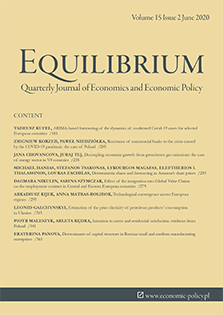Decoupling economic growth from greenhouse gas emissions: the case of energy sector in V4 countries
Decoupling economic growth from greenhouse gas emissions: the case of energy sector in V4 countries
Author(s): Jana Chovancová, Juraj TejSubject(s): Agriculture, Energy and Environmental Studies, Environmental and Energy policy, Political economy, Environmental interactions, Marketing / Advertising
Published by: Instytut Badań Gospodarczych
Keywords: greenhouse gas emissions; energy sector; Gross Value Added; decoupling; V4 countries;
Summary/Abstract: Research background: The production and use of energy satisfies human needs, but also gives rise to a host of adverse environmental pressures, such as air pollution and waste generation. The issue of energy efficiency and climate chance resonates in the energy sector as one of the main producers of green-house gas emissions (GHG). While the European Union in general is doing well in reducing emissions and increasing the share of renewables, unfortunately, there are countries that are still far from reaching their goal. Purpose of the article: The paper is focused on the quantitative assessment of the link between the economic growth of the energy sector and the production of GHG emissions by the energy sector in V4 countries during the period 1995–2016. For this purpose, decoupling analysis will be realized. Methods: The decoupling of economic growth and the environmental pressures caused by this growth has a rich tradition within the sustainable development literature. The decoupling method was chosen for its ability to link economic and environmental indicators. Decoupling elasticity will be calculated with the aim of assessing the relationship between the economic growth of the energy sector (measured in GVA) and GHG emissions produced by the energy sector in V4 countries within the research period. Decoupling elasticity indicates different forms of the decoupling and coupling of the two variables. Findings & Value added: The results of the analysis suggest the prevailing strong decoupling of the economic growth of the energy sector and GHG emissions produced by the energy sector, which can be considered a positive trend. The findings of this paper are relevant for the government, state and public institutions and stakeholders in general, who play important roles in the preparation of programs, projects and policies to make energy generation, transport and use more efficient and environmentally sustainable.
Journal: Equilibrium. Quarterly Journal of Economics and Economic Policy
- Issue Year: 15/2020
- Issue No: 2
- Page Range: 235-251
- Page Count: 17
- Language: English

